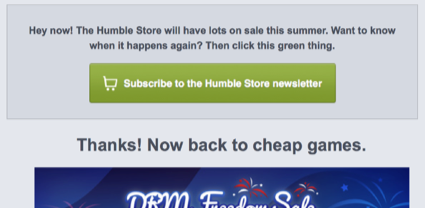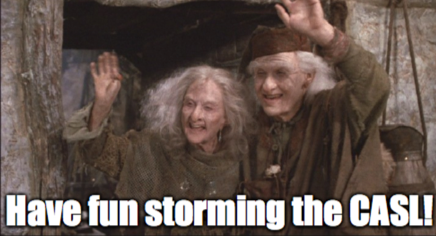Have fun storming the CASL!
- steve
- July 3, 2014
- Best practices
I’ve given Humble Bundle my (tagged) email address a bunch of times – as part of purchases, as my username on their website, to download games and books I’ve bought.
And, naturally, they’ve sent me newsletters announcing when they have new sales. Did I check a checkbox or uncheck a checkbox? I don’t remember, and don’t really care. It’s a company I have a real relationship with and have purchased from, they’re sending content I want to see, and I trust them not to misuse my address and to honour an unsubscription request.
So … probably opt-in, and I’m fairly sure they’ve confirmed that it’s my email address. But did they explicitly tell me they’d use my email address for a newsletter? I and my email archive don’t remember that far back, and it’s quite possible that Humble Bundle’s current staff and records don’t either.
In todays newsletter, right above their talking about their summer sales, they had this:

They’re confirming that I want to keep getting newsletters, and stressing why I want to keep getting them. Their database probably dates back to the iron age, or at least 2010, and my clicking on the big, friendly green button both lets them know that I’m an engaged subscriber and lets them record in their database that “Yes! This subscriber has explicitly said they want our newsletters!”.
Gradually adding that information to their subscriber database will let them better make decisions in the future about what content to send, how often, whether to try and reengage with a subset of their subscribers.
Oh, and there’s CASL, of course.
If you or your recipients have a Canadian presence you have a little less than eighteen months to make sure you have documented, explicit consent from any recipients for whom you only have implicit (e.g. business relationship) consent or for whom you’ve lost the original records.